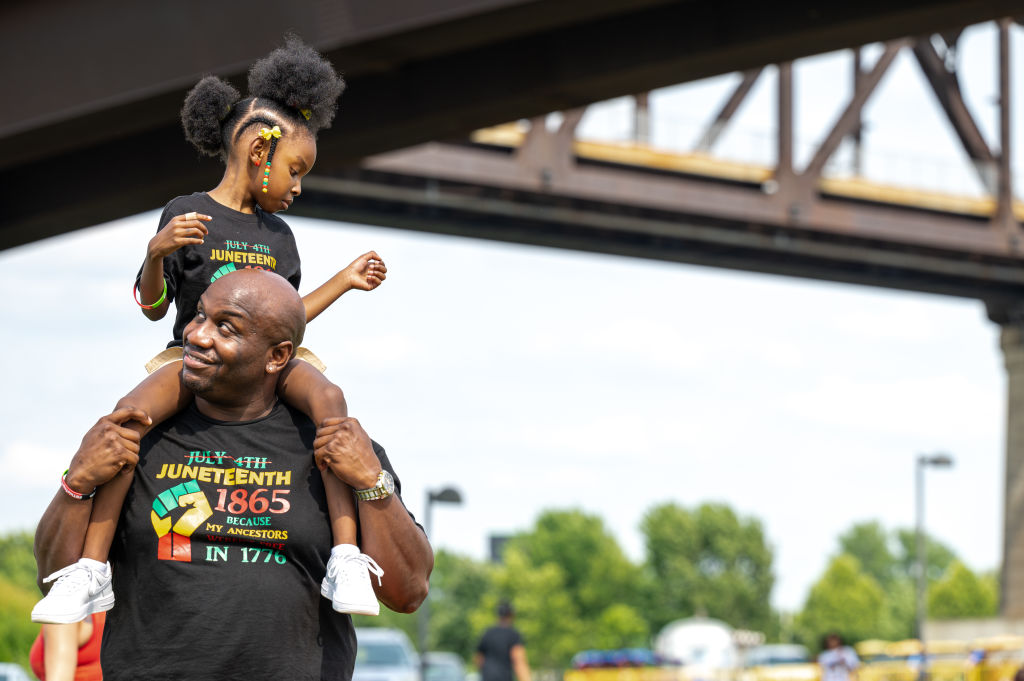
Americans are preparing to observe the newest federal holiday on Sunday: Juneteenth, in honor of the June 19, 1865, occasion on which enslaved men and women in Galveston, Texas, found out they were free after the Civil War. Many will get a long weekend that includes Monday, June 20—but, especially given the holiday’s history, figuring out appropriate ways to mark that day is still a work in progress.
Already, companies are learning how not to celebrate Juneteenth. Walmart apologized for selling pints of Juneteenth-themed red velvet ice cream—which some said was similar to one sold by a Cincinnati-based Black-owned business Creamalicious. The Children’s Museum of Indianapolis apologized for selling a Juneteenth-themed watermelon salad in its cafeteria. And Dollar Tree garnered criticism from Black Twitter users for promoting Juneteenth-themed paper plates and napkins.
“You know that song ‘June Is Bustin’ Out All Over?’ It’s like Juneteenth is bustin’ out all over,” says Rev. John Mosley, who has been organizing Juneteenth gatherings in New Orleans since the early 1990s.
TIME talked to Black activists who have organized Juneteenth celebrations for decades—including campaigners who advocated for Juneteenth to become a national holiday, a goal they achieved in 2021. They all agreed that it will take some time for most Americans to learn the best ways to honor Juneteenth—and that some commercialization is to be expected. And they said that while summer gatherings with friends and family are totally appropriate for Juneteenth, those celebrations should ideally support the Black community in some way, and include an educational component—whether reflecting on the origins of the holiday and its legacy or participating in ongoing work to achieve full racial equality.
“I’m hoping that I don’t look up one day and see Juneteenth sales like you see Fourth of July sales, but of course at some point in the future it could happen,” says Deborah Evans, a spokesperson for the National Juneteenth Observance Foundation, which promotes educational programming about Juneteenth and advocated for Juneteenth to become a federal holiday. “We’ve been the stepchild of holidays for years. It was mainly within the Black community, so we do need to have more education as to what Juneteenth means. Right now, it is just a picnic day to a lot of people.”
Cliff Robinson, who runs the website Juneteenth.com which lists Juneteenth celebrations nationwide, says that people should think of Juneteenth as another Memorial Day—which commemorates Americans who died serving their country or Veterans Day—which celebrates those who served. Reacting to Walmart’s Juneteenth ice cream debacle he says, “We don’t have a Veterans Day ice cream, we don’t have a Memorial Day ice cream.” He suggests companies make a special effort to partner with Black entrepreneurs and companies for the holiday because Juneteenth “is all about healing and righting the wrongs that resulted from slavery.”
Many Juneteenth celebrations, Robinson says, involve going to church, so he encourages people to go to a church where the minister will talk about Juneteenth. Churches have always been a place of refuge in the Black community. Juneteenth church services may include a gospel choir performance, and this year, the National Juneteenth Observance Foundation is asking houses of worship to post on their doors General Order No. 3, the 1865 document that notified enslaved Texans of their freedom.
Steve Williams, President of the National Juneteenth Observance Foundation who advocated on Capitol Hill for Juneteenth to be made a national holiday, said proper Juneteenth gatherings should include readings of the “freedom documents”: the Emancipation Proclamation; the 13th Amendment, which abolished slavery; and General Order No. 3.
Juneteenth celebrations are relatively new, even to many in the Black community. Ronald V. Myers founded the National Juneteenth Observance Foundation more than 25 years ago, and got Juneteenth on the calendars in 43 states and the District of Columbia. While the day has been observed in various ways since 1865, Juneteenth became more popular after the civil rights movement of the 50s and 60s. It grew in prominence in 2020 after the murder of George Floyd helped spark racial-justice protests across the country, and particularly after former President Trump’s attempt to host a rally on Juneteenth in Tulsa, Oklahoma, a place where, 100 years earlier, a mob of white residents had burned down a neighborhood known as Black Wall Street, killing as many as 300 of their fellow Black Tulsans.
Ninety-five-year-old Juneteenth activist Opal Lee of Fort Worth, Texas, who witnessed President Joe Biden sign the bill that made Juneteenth a national holiday last year, says she hopes Juneteenth becomes a day of service. At the very least, she says, her wish is for people to do one kind act for someone.
“I don’t mean we just come together and celebrate. We’ve got to look after each other,” says Lee. “I don’t mean you’ve got to do something stupendous: Smile at somebody or watch the children while their mother goes to the store, or help an old lady like myself across the street.”
But Juneteenth activists also hope that the holiday will encourage people to talk about what is needed to end racial disparities year-round.
“Juneteenth ain’t a Black thing, not a Texas thing. It’s about freedom for everybody,” says Lee. “As long as we have joblessness, homelessness, and health care that some can get and others can’t, and climate change—all these things need to be addressed for us to be free.”
More Must-Reads from TIME
- Why Trump’s Message Worked on Latino Men
- What Trump’s Win Could Mean for Housing
- The 100 Must-Read Books of 2024
- Sleep Doctors Share the 1 Tip That’s Changed Their Lives
- Column: Let’s Bring Back Romance
- What It’s Like to Have Long COVID As a Kid
- FX’s Say Nothing Is the Must-Watch Political Thriller of 2024
- Merle Bombardieri Is Helping People Make the Baby Decision
Write to Olivia B. Waxman at olivia.waxman@time.com